A peer and former charity worker has challenged charities over whether they know more about small, disadvantaged communities than budget supermarket chain Lidl - and whether those communities would prefer to see charities or Lidl operating in their town.
Baroness Barker, a Liberal Democrat peer, and one of the authors of Stronger Charities for a Stronger Society, a House of Lords report on charities, said that the rising amount of data available made it possible for larger organisations such as supermarket chains to understand their beneficiaries in a way that charities themselves sometimes did not.
"We're looking at a new world where charities are as much online as they are physical," she told the charity governance conference at ICSA: the Governance Institute, in London on Friday. "We had some concerns about how charities were dealing with this. We kept coming back to this idea that charities are at the heart of their communities. Towns up and down the land are dealing with devastating economic changes and we wondered about the capacity of charities to deal with that.
"Charities have had a vital role in mitigating the horrors of inequality. We thought long and hard about charities' ability to play that role in an increasingly fractured society.
"One question we asked was: in small towns who knows more about your community - the voluntary sector or Lidl? And who would you be more pleased to see?"
Speaking to Civil Society News after her speech, she said that historically, sector workers had known every detail about the communities in which they operated, and many still did. But the increase in electronic data potentially offered supermarket operators the chance to know things about communities that the sector did not.
She said that charities knew many things not revealed by data - that a worker at a charity working with homeless people might know all of them personally, and know the location of every rough sleeper. But data analysis offered a completely different type of way of understanding these communities, and that she was not sure charities were making the best use of it.
"The second part of my challenge - who would you be more pleased to see - was really about jobs," she said.
She said she did not know the answer to the challenge, and that it was easy to underestimate charities' impact on communities.
She said that in her view, there was a huge deficit in digital skills in the charity sector, that digital competence was now as valuable as finance, and that it was as necessary to have digital expertise as financial expertise on a charity board.
Funding system is broken
Barker also criticised the "complete collapse" in local authority funding for charities, and a move away from grant funding.
"These are important things to hold onto," she said. "Often its local charities who are the point of reference when things go wrong in their communities.
"But we can't see the return to grant funding to the extent it existed even in the 1990s. We could see that the current system is broken. It's not working at all.
"We heard a lot of criticism of the current system of contracting, and we saw the potential of the strategic role of grant funding for particular sectors."
Time for the sector to change
Barker also said that charities have in the past felt they had a “charmed existence” and that the rules did not apply to them. She said the sector had to accept this was just not true.
“Charities have in the past somehow felt there wasn’t a need for them to be as heavily regulated as the private sector,” she said. “No more. We have to accept it and get on with it.”
Barker also said that it was vital that trustees receive proper support and proper training. She said that infrastructure bodies needed to work more closely together to ensure that trustees were properly trained.
She said that the House of Lords report into charities was not about recommendations for government, but about challenging the sector itself to change.
“How do we go back to being the place where we enable people to form connections and find solutions to their problems?” she said. “It’s not about waiting for government.”
Related articles









